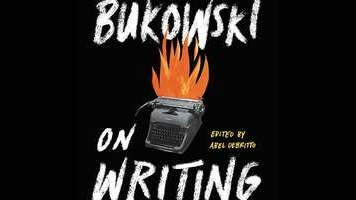Unlike Stephen King’s 2000 book of the same title, Charles Bukowski’s On Writing is less concerned with the art of its author’s chosen craft than the business of it, the dispiriting processes of pitching and revisions that any professional wordsmith will be oh-so-familiar with. Also unlike King’s, Bukowski’s book is a collection of correspondences, not a structured work, and certainly not one written explicitly for publication (though at one point he frets that a mention of black and gay poets will be taken the wrong way by hypothetical readers, so he throws in a mention of Mexican and lesbian ones). But this is not a hastily assembled cash grab; Bukowski’s voice is fully present here, and it’s just as crudely eloquent as in his more famous works.
Admittedly, this is a book for a narrow audience. If you haven’t read Bukowski, this is not the place to start (that would be Ham On Rye). If you don’t like his style, On Writing won’t change your mind. If you do like him, this is so inside baseball that the material itself may be of little interest, and even if you’re a fan in a relevant creative field, the book doesn’t offer opportunities to learn so much as commiserate. No doubt BuzzFeed will scour it to pad listicles of inspirational writing quotes (for your image macro consideration: “Sometimes I’ve called writing a disease. If so, I’m glad that it caught me.” “It’s when you begin to lie to yourself in a poem in order to simply make a poem, that you fail.” “Writing is like most writers think fucking is: just when they start thinking they are doing it pretty good they stop doing it altogether.”), but the biggest impression it leaves is of struggle and failure. Bukowski is a guy, after all, who got rejected from Hustler, which wrote, “The subject matter is just too strong for us to handle. Specifically, it’s the beastiality and also its violent result.”
That On Writing manages to be engaging and even hilarious despite that is all due to Bukowski’s voice, which not only shines through in the letters selected by editor Abel Debritto, but is unusually pure in the selections. Perhaps that’s to be expected; Bukowski’s novels were ramshackle and conversational, essentially personal messages to readers, and it’s no surprise he proves just as focused on sex and booze as alter ego Henry Chinaski.
Though many of the entries scarcely fill half a page and deal with the status of obscure work submitted to various publications, others could be published as standalone short stories. Consider the passage below, which is remarkably disciplined on a technical level while remaining fluid. (The book keeps what Debritto calls Bukowski’s “whimsical” approach to spelling and grammar.)
when I was married to this millionairess, I was lying on the rug drunk and listening to F.’s Symphony in D., she sat there and said, “I think that music is ugly!” so I knew right then that the million was gone. I couldn’t make it with her. and to prove it, that night when I fucked her in the bedroom all the shelves fell down and flowerpots and trinkets came down upon my back and ass. I mean, I do a good job, but not that good. she thought it was ugly when I laughed then too, and stuck it back in and saw the million going going… “I don’t like a man who makes fun of himself, I don’t like a man who laughs at himself. I like a man who has pride,” she told me. well, I’ve got to laugh because I am ridiculous; I am only temporarily made, I shit and wipe my ass, am full of snot and slime and bugs and grandiose notions… but I really am a turd, nothing but a turd.
Grotesque to be sure, but his repetitions give it a flow that’s no less musical for being gangly. Bukowski may have been a slob, but he was exact; letters here show him fretting over minor word choices (“did not get paid” versus “didn’t get paid”) and ranting at overzealous editors: “My writing is jagged and harsh, I want it to remain that way, I don’t want it smoothed out.” Smoothness would defeat the purpose of the passage above, and most writers couldn’t hit that kind of purposeful jaggedness on their eighth draft.
The letters span from 1945 to 1993, which means a good chunk concern the period before he was established or even really published. That era offers some laughs and insights—he’s so desperate for money at one point that when he receives an offer of $10 for two poems, he counters with $20, for eight poems—but it gets repetitive and tedious (a problem shared by novels like Women). As the book moves forward it becomes more satisfying, his success and experiences giving him a deeper authority to speak from. There’s something very sweet about the pleasure the old man takes from receiving fan mail from people who write, “If you’ve made it maybe there’s a chance for me.”
Of course, being Bukowski, he also notes, “I do not pretend to be a Christ-like creature, and anyhow it wouldn’t be worth a cat-tured to be a Christ-like creature, don’t you think? I don’t think.”









































